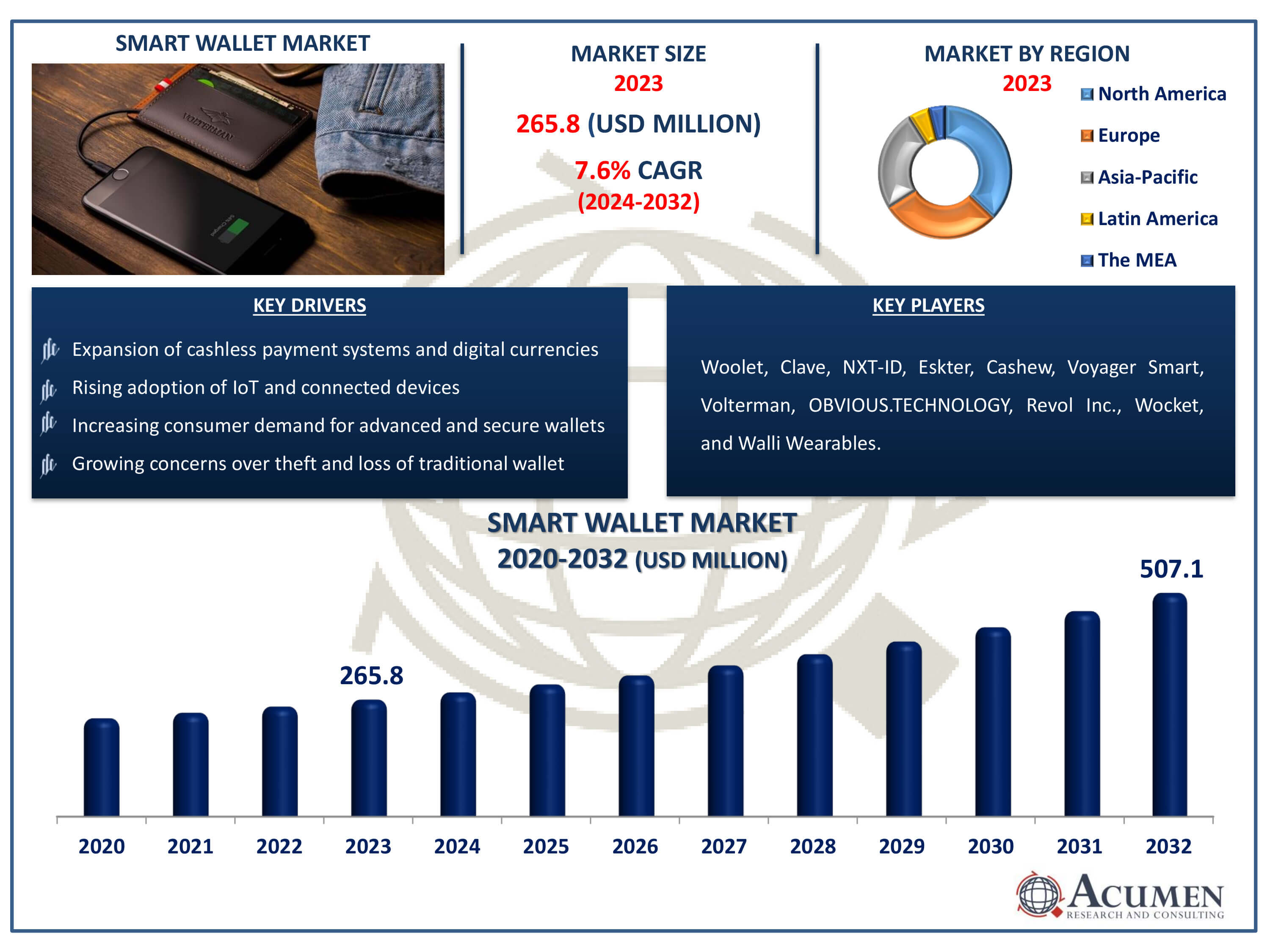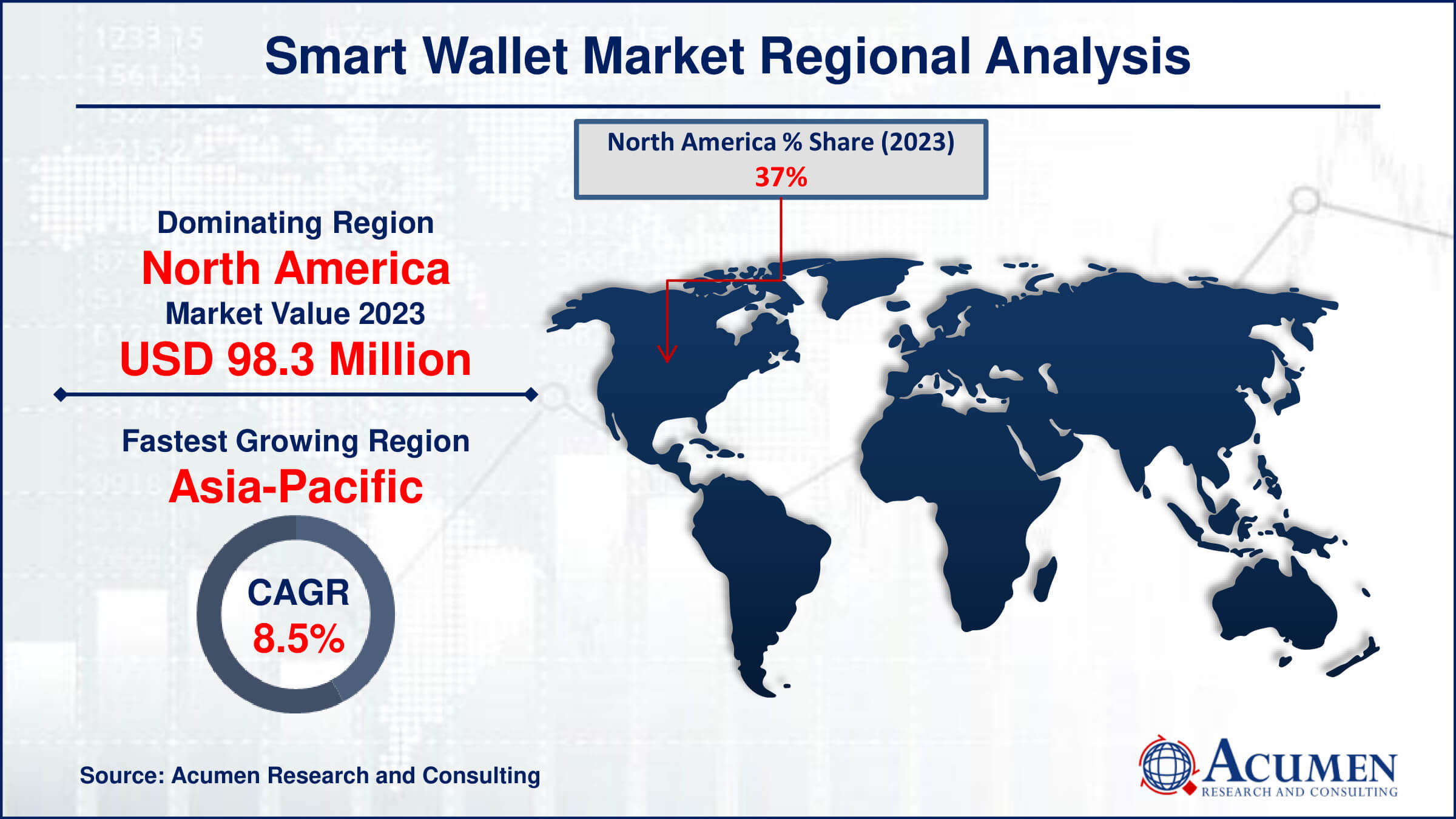Smart Wallet Market Size - Global Industry, Share, Analysis, Trends and Forecast 2024 - 2032
Published :
Report ID:
Pages :
Format :
Smart Wallet Market Size - Global Industry, Share, Analysis, Trends and Forecast 2024 - 2032
Report Coverage
- Industry Dynamics
- Market Size and Forecast Data
- Segment Analysis
- Competitive Landscape
- Regional Analysis with a Niche Focus on Country-Level Data
- High Level Analysis - Porter's, PESTEL, Value Chain, etc.
- Company Profiles of Key Players
- Option to Customize the Report As Per Your Specific Need
Request Sample Report
The Smart Wallet Market Size accounted for USD 265.8 Million in 2022 and is estimated to achieve a market size of USD 507.1 Million by 2032 growing at a CAGR of 7.6% from 2024 to 2032.
Smart Wallet Market Highlights
- Global smart wallet market revenue is poised to garner USD 507.1 million by 2032 with a CAGR of 7.6% from 2024 to 2032
- North America smart wallet market value occupied around USD 98.3 million in 2022
- Asia-Pacific smart wallet market growth will record a CAGR of more than 8.5% from 2024 to 2032
- Among material type, the leather sub-segment generated significant revenue in 2022
- Based on connectivity, the Wi-Fi sub-segment generated noteworthy market share in 2022
- Development of eco-friendly smart wallet materials is a popular smart wallet market trend that fuels the industry demand

A smart wallet is a technologically advanced wallet that can store more than just money and cards. It often has Bluetooth connectivity, GPS tracking, RFID protection, and, in some cases, built-in power banks for charging electronics. These features enable customers to follow their wallet's position using a smartphone app, reducing loss or theft. RFID shielding protects cards against illegal scans. Some smart wallets also have alarms that will alert users if they leave their wallet behind. Smart wallets, with their sleek designs and robust materials, strive to provide convenience and better security, making them a practical alternative for those who are tech-savvy and security conscious.
Global Smart Wallet Market Dynamics
Market Drivers
- Increasing consumer demand for advanced and secure wallets
- Rising adoption of IoT and connected devices
- Growing concerns over theft and loss of traditional wallets
- Expansion of cashless payment systems and digital currencies
Market Restraints
- High cost of smart wallets compared to traditional ones
- Limited battery life and the need for regular charging
- Potential privacy concerns related to data tracking
Market Opportunities
- Integration with blockchain for enhanced security
- Expansion into emerging markets with rising smartphone adoption
- Collaboration with financial institutions for exclusive features
Smart Wallet Market Report Coverage
| Market | Smart Wallet Market |
| Smart Wallet Market Size 2022 | USD 265.8 Billion |
| Smart Wallet Market Forecast 2032 | USD 507.1 Billion |
| Smart Wallet Market CAGR During 2023 - 2032 | 7.6% |
| Smart Wallet Market Analysis Period | 2020 - 2032 |
| Smart Wallet Market Base Year |
2022 |
| Smart Wallet Market Forecast Data | 2023 - 2032 |
| Segments Covered | By Type, By Material Type, By Connectivity, By Sales Channel, And By Geography |
| Regional Scope | North America, Europe, Asia Pacific, Latin America, and Middle East & Africa |
| Key Companies Profiled | Woolet, NXT-ID, Voyager Smart, Clave, Volterman, Eskter, OBVIOUS.TECHNOLOGY, Cashew, Revol Inc., Wocket, and Walli Wearables. |
| Report Coverage |
Market Trends, Drivers, Restraints, Competitive Analysis, Player Profiling, Covid-19 Analysis, Regulation Analysis |
Smart Wallet Market Insights
In recent years, sales of clothing and accessories stores in the U.S. have been significant. With changing consumer spending habits and growing awareness of data theft, manufacturers are focusing on offering enhanced smart accessories. The rise of online shopping has encouraged players to launch new products online, and major companies are expanding their product portfolios with innovative solutions, boosting the growth of the smart wallet market. In 2019, Ekster introduced a voice-activated smart wallet with a solar-powered tracking system and RFID protection, aimed at increasing business and revenue. Similarly, in 2016, Cuir Ally launched the luxury leather Voyager Smart Wallet in India, strengthening its presence in the Indian market.
Tourism is booming in developing countries, and consumers are keen on protecting their financial information, driving demand for smart wallets. However, high product costs and concerns about data theft may hinder market growth. Despite these challenges, growing consumer acceptance of modern accessories and innovative solutions from major players are expected to create new market opportunities during the smart wallet industry forecast period. Additionally, increasing partnerships are likely to support revenue growth in the smart wallet market.
The use of biometric technologies is a notable development in the smart wallet business. As security concerns develop, people are looking for more trustworthy solutions to safeguard their financial information. Biometric technology, such as fingerprint scanners and facial recognition, provides an extra layer of protection by guaranteeing that only authorized users have access to the wallet's contents. This not only helps to prevent theft, but also provides convenience by allowing users to access their wallets without having to remember passwords or carry keys. Major players are progressively implementing these capabilities into new models, which frequently have inbuilt fingerprint sensors for quick and safe access. The deployment of biometric technologies is likely to boost consumer confidence and promote demand for smart wallets, demonstrating continual innovation to satisfy changing consumer expectations.
Smart Wallet Market Segmentation
The worldwide market for smart wallet is split based on type, material type, connectivity, sales channel, and geography.
Smart Wallets Market By Type
- Wireless Charging
- Wired Charging
According to smart wallet industry analysis, wireless charging is gaining traction in the market, with wireless charging now accounting for the majority of market share. This choice is determined by a variety of things. For starters, wireless charging is extremely convenient, letting customers to simply set their wallets on charging pads without having to worry with connections. Second, it is consistent with the general consumer trend toward wireless technologies, promoting a clutter-free and smooth user experience. Furthermore, developments in wireless charging technology have increased efficiency and charge speeds, adding to its popularity. Furthermore, the increasing integration of wireless charging capabilities into a variety of accessories and gadgets helps to its widespread use. Overall, these characteristics establish wireless charging as the favored option in the smart wallet market, resulting in a considerable market share.
Smart Wallets Market By Material Type
- Leather
- Metal
Leather is expected to become the main material type, surpassing metal rivals. This prognosis is supported by several significant elements. For starters, leather has a timeless appeal and is often associated with luxury and durability, making it a popular choice among consumers looking for smart wallets that combine elegance and utility. Second, advances in leather processing processes have resulted in the creation of high-quality, eco-friendly leather varieties that appeal to ecologically concerned consumers. Additionally, leather provides a tactile and luxurious feel, which improves the whole user experience. Furthermore, leather's adaptability enables customization and branding, responding to a wide range of consumer tastes. As a result, these characteristics jointly position leather as the market leader and it is expected to grow in smart wallet market forecast period, indicating that it will outperform metal materials.
Smart Wallets Market By Connectivity
- Wi-Fi
- Bluetooth
The predicted dominance of Wi-Fi connectivity in the smart wallet market originates from its unrivaled versatility and widespread availability. Wi-Fi allows for easy integration with a wide range of smart devices and platforms, increasing interconnectedness and allowing users to take use of a greater range of features. Unlike Bluetooth, which has a limited range, Wi-Fi connectivity extends the reach of smart wallets, providing remote access and real-time updates from nearly any location with internet access. Furthermore, the widespread availability of Wi-Fi infrastructure in urban and public settings increases its convenience and utility, promoting customer preference. As a result, Wi-Fi connectivity's expected highest market share highlights its critical role in molding the future landscape of smart wallets, catering to the changing expectations of tech-savvy consumers.
Smart Wallets Market By Sales Channel
- Online Channel
- Offline Channel
The anticipated supremacy of offline sales channels in the smart wallet market underscores the enduring appeal and tangible benefits of in-person shopping experiences. Despite the ever-expanding realm of online commerce, brick-and-mortar outlets retain a distinct advantage by providing hands-on engagement opportunities. Customers can physically inspect and interact with smart wallets, fostering a deeper connection and confidence in their purchase decisions. Moreover, the presence of knowledgeable sales associates facilitates personalized guidance and tailored recommendations, enriching the overall shopping journey. This human element cultivates trust and reliability, resonating strongly with consumers who prioritize authenticity and immediate gratification. Ultimately, the anticipated dominance of offline channels reflects the enduring allure and irreplaceable value of traditional retail encounters in the dynamic landscape of smart wallet sales.
Smart Wallet Market Regional Outlook
North America
- U.S.
- Canada
Europe
- U.K.
- Germany
- France
- Spain
- Rest of Europe
Asia-Pacific
- India
- Japan
- China
- Australia
- South Korea
- Rest of Asia-Pacific
Latin America
- Brazil
- Mexico
- Rest of Latin America
The Middle East & Africa
- South Africa
- GCC Countries
- Rest of the Middle East & Africa (ME&A)

Smart Wallet Market Regional Analysis
In terms of smart wallet market analysis, the North America is booming because folks are increasingly concerned about keeping their money and cards safe. With smart wallets, consumers can link them to their phone, making it easy to track them down if they're misplaced or stolen. This convenience, coupled with the added security features like RFID blocking, is driving up demand. Companies are pouring resources into research and development to make these wallets even more advanced and user-friendly. By integrating digital features and enhancing safety measures, they're attracting more customers who want the latest tech gadgets. Plus, with the government investing heavily in IT infrastructure, and consumers gravitating toward smart products, the market is ripe for growth.
Meanwhile, in Asia-Pacific, the smart wallet market is experiencing rapid expansion. Consumers in this region have a strong appetite for smart accessories, and they're increasingly turning to smart wallets for their convenience and tech-savvy features. Major players are not only tapping into this growing demand but also exploring untapped markets in developing regions.
Smart Wallet Market Players
Some of the top smart wallet companies offered in our report includes Woolet, NXT-ID, Voyager Smart, Clave, Volterman, Eskter, OBVIOUS.TECHNOLOGY, Cashew, Revol Inc., Wocket, and Walli Wearables.
Frequently Asked Questions
How big is the smart wallet market?
The smart wallet market size was valued at USD 265.8 million in 2022.
What is the CAGR of the global smart wallet market from 2024 to 2032?
The CAGR of smart wallet is 7.6% during the analysis period of 2024 to 2032.
Which are the key players in the smart wallet market?
The key players operating in the global market are including Woolet, NXT-ID, Voyager Smart, Clave, Volterman, Eskter, OBVIOUS.TECHNOLOGY, Cashew, Revol Inc., Wocket, and Walli Wearables.
Which region dominated the global smart wallet market share?
North America held the dominating position in smart wallet industry during the analysis period of 2024 to 2032.
Which region registered fastest CAGR from 2024 to 2032?
Asia-Pacific region exhibited fastest growing CAGR for market of smart wallet during the analysis period of 2024 to 2032.
What are the current trends and dynamics in the global smart wallet industry?
The current trends and dynamics in the smart wallet industry include increasing consumer demand for advanced and secure wallets, rising adoption of IoT and connected devices, growing concerns over theft and loss of traditional wallets, and expansion of cashless payment systems and digital currencies.
Which material type held the maximum share in 2022?
The leather material type held the maximum share of the smart wallet industry.


